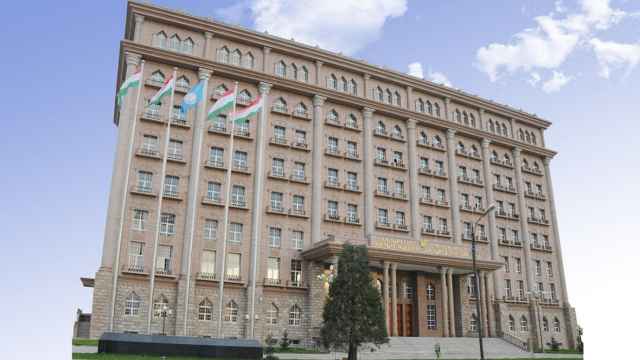Russia will join the European Space Agency to launch a mission to Mars to sample dirt for signs of life, stepping in after NASA pulled out, the Federal Space Agency said.
Despite describing the ExoMars project as the "Holy Grail of Mars exploration," NASA left the $1.3 billion project in February, citing a budget crunch and a change in focus.
That gave Europe little choice but to turn to Russia or China for a launch vehicle for the two-spacecraft mission to collect and return soil from the Red Planet. Launches are planned in 2016 and 2018.
Federal Space Agency chief Vladimir Popovkin and European counterpart Jean-Jaques Dordain pledged after talks in Moscow to work together on the project, Popovkin's spokeswoman said Friday.
But the European Space Agency did not comment on the talks, citing their sensitivity.
And many uncertainties remain over the extent of Russia's cooperation and its willingness to share the financial burden.
"The sides consider that the current project is feasible and represents a joint scientific interest," said spokeswoman Anna Vedishcheva, adding that the Federal Space Agency and ESA would sign a deal on the terms of the project by year-end.
Russia's involvement in the ambitious mission could boost the status of its once-pioneering space agency after a string of costly and embarrassing recent mission failures.
Among five botched launches last year was the Fobos-Grunt craft, which had been intended to reach one of Mars's moons and would have marked the agency's return to deep space after a two-decade absence.
The Federal Space Agency plans to launch the ExoMars spacecrafts on its Proton rocket but also wants to provide an entry, descent and landing vehicle for the second leg of the mission, experts say.
"We want full-fledged cooperation in the main elements of the spacecraft," said Igor Lissov, an expert with trade journal Novosti Kosmonavtiki, which is published by the Federal Space Agency. "The option of having a European orbital model and our landing craft would be acceptable."
European governments have so far committed 850 million euros ($1.1 billion) for the so-called Exobiology on Mars, or ExoMars, mission.
The cap for the project had been set at 1 billion euros, but NASA's withdrawal and delays as well as changes to the scientific aspects of the mission are expected to drive up the price tag.
Russia unveiled a space strategy earlier this year that included manned missions to the Moon but revealed no financial details.
The Academy of Sciences plans several projects to explore the moon, Venus and Mercury in the next 20 years, Bloomberg reported.
Russia plans to send two moon rovers after 2020 and several landing stations after 2022 to form a lunar practice ground for exploring the satellite’s polar areas, it said, citing a draft program on solar system exploration obtained by RIA-Novosti. Scientists are also planning to launch the Venus-D lander, an orbital unit and a satellite after 2024 to explore Venus’ atmosphere and geology. The country’s plan for the first-ever lander to Mercury won’t be for at least 20 years, later than an earlier target of 2019.
A Message from The Moscow Times:
Dear readers,
We are facing unprecedented challenges. Russia's Prosecutor General's Office has designated The Moscow Times as an "undesirable" organization, criminalizing our work and putting our staff at risk of prosecution. This follows our earlier unjust labeling as a "foreign agent."
These actions are direct attempts to silence independent journalism in Russia. The authorities claim our work "discredits the decisions of the Russian leadership." We see things differently: we strive to provide accurate, unbiased reporting on Russia.
We, the journalists of The Moscow Times, refuse to be silenced. But to continue our work, we need your help.
Your support, no matter how small, makes a world of difference. If you can, please support us monthly starting from just $2. It's quick to set up, and every contribution makes a significant impact.
By supporting The Moscow Times, you're defending open, independent journalism in the face of repression. Thank you for standing with us.
Remind me later.





